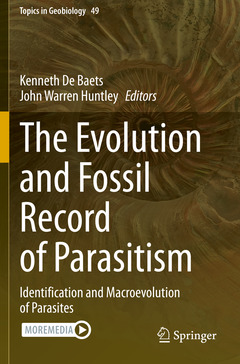The Evolution and Fossil Record of Parasitism, 1st ed. 2021 Identification and Macroevolution of Parasites Topics in Geobiology Series, Vol. 49
Coordonnateurs : De Baets Kenneth, Huntley John Warren

This two-volume edited book highlights and reviews the potential of the fossil record to calibrate the origin and evolution of parasitism, and the techniques to understand the development of parasite-host associations and their relationships with environmental and ecological changes. The book deploys a broad and comprehensive approach, aimed at understanding the origins and developments of various parasite groups, in order to provide a wider evolutionary picture of parasitism as part of biodiversity. This is in contrast to most contributions by parasitologists in the literature that focus on circular lines of evidence, such as extrapolating from current host associations or distributions, to estimate constraints on the timing of the origin and evolution of various parasite groups. This approach is narrow and fails to provide the wider evolutionary picture of parasitism on, and as part of, biodiversity.
Chapter 1. Parasites of Fossil Vertebrates: What We Know and What can We Expect from the Fossil Record?.- Chapter 2. Fossil Record of Viruses, Parasitic Bacteria and Parasitic Protozoa.- Chapter 3. Fungi as Parasites: A Conspectus of the Fossil Record.- Chapter 4: Evolution, Origins and Diversification of Parasitic Cnidarians.- Chapter 5. Evolutionary History of Bivalves as Parasites.- Chapter 6. Gastropods as Parasites and Carnivorous Grazers – A Major Guild in Marine Ecosystems.- Chapter 7: Fossil Constraints on the Timescale of Parasitic Helminth Evolution.- Chapter8. Thorny-headed Worms (Acanthocephala): Jaw-less Members of Jaw-bearing Worms that Parasitize Jawed Arthropods and Jaw-bearing Vertebrates.- Chapter 9. Chelicerates as Parasites.- Chapter 10. Evolutionary History of Crustaceans as Parasites.- Chapter 11. The History of Insect Parasitism and the Mid-Mesozoic Parasitoid Revolution.
Dr. John Huntley is an Associate Professor in the Department of Geological Sciences at the University of Missouri. He graduated from Appalachian State University with a Bachelors of Science in 2000, then earned his Masters in Geology at the University of North Carolina at Wilmington in 2003, and his PhD in Geosciences at Virginia Polytechnic Institute and State University in 2007. His main research interests include the fossil record of biotic interactions, stratigraphic andconservation paleobiology, and the evolution of morphological disparity.
Date de parution : 05-2022
Ouvrage de 565 p.
15.5x23.5 cm
Date de parution : 05-2021
Ouvrage de 565 p.
15.5x23.5 cm



